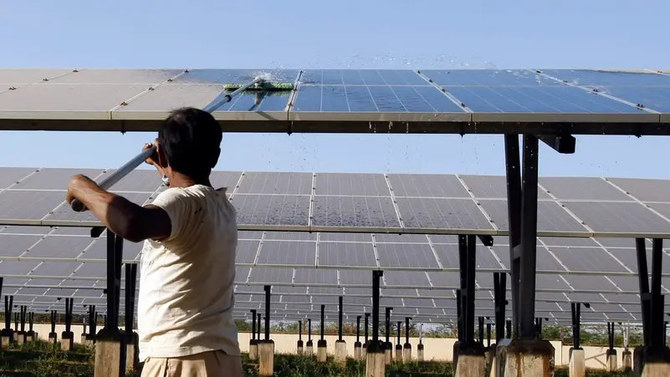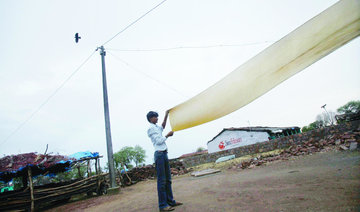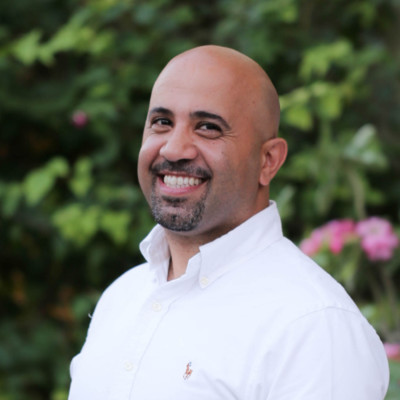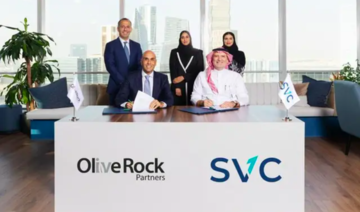AITAWADE BUDRUK, India: Going to the bank in his home village in western India used to be a slow, frustrating process for Kiran Patil, as frequent power cuts — sometimes lasting for days — turned what should have been a quick errand into a lengthy ordeal.
The 59-year-old farmer often had to wait for hours in line at RBL Bank, his local branch in the village of Aitawade Budruk, or abandon his transaction and return the next day, wasting time he should have been spending cultivating his crops.
All that changed after the building was fitted with a set of solar panels and backup storage batteries in 2018, breaking the bank’s reliance on the power grid and giving it a steady supply of clean electricity.
“The transactions now are so smooth and fast,” Patil told the Thomson Reuters Foundation. “These days we even find time for a quick chat with the branch manager over a cup of tea, to learn of the latest services and facilities.”
A more reliable banking experience is also bringing in new customers who previously didn’t have the time for long waits or who worried about never knowing when they would be able to access their money.
Since the solar power system was installed at RBL in Aitawade Budruk, the bank has been opening 25 to 30 new accounts every month — 10 times more than before, said branch manager Sandeep Banne.
As India boosts its use of renewable energy in an effort to wean itself off climate-heating coal, the country is leaning heavily on solar energy to cut carbon emissions and help stabilize a grid squeezed by coal shortages and surging demand from a population trying to keep cool during hotter summers.
But some communities have discovered another benefit to the solar power push: greater financial system access for millions of the country’s unbanked, including the estimated 20 percent of Indian adults, who have no access to a bank account or formal line of credit.
Raghuraman Chandrasekaran, founder and CEO of E-Hands Energy, the Chennai-based firm that set up the solar unit in Aitawade Budruk, said his company has installed such systems at more than 920 rural banks across India, helping bring more than 6 million people into the formal banking system.
The company plans to install units at up to 100 more rural branches before the end of the year, he said.
“Citizens in rural areas were walking or spending their precious money to transport themselves from their villages to the nearest bank branch, then waiting (there) for hours … simply because the bank did not have electricity all day and the computers could not work,” said Chandrasekaran.
“It was all misery.”
MODERN BANKING
The three-kilowatt solar power system at the Aitawade Budruk branch — which runs everything from the fans and lights to computers and alarm systems — means the bank now has reliable power about 95 percent of the time, said Banne, the branch manager.
On cloudy days, backup storage batteries take over, he said.
Firms like E-Hands Energy, Tata Power Solar and Husk Power Systems have so far outfitted more than 2,000 banks in rural India with solar power, estimates Shyam Kumar Garg, who retired as deputy general manager at the National Bank for Agriculture and Rural Development last October.
The systems feed into India’s efforts to install 500 gigawatts (GW) of renewable energy capacity by 2030, up from about 115 GW now, more than half of which is solar.
E-Hands Energy’s manager of operations Kakumanu Prathap Sagar said the solar systems the company has installed at banks around India is helping cut about 3,000 tons of carbon emissions every year.
Going solar can cut costs, too, said Banne at RBL in Aitawade Budruk, noting that the branch now spends a fraction of what it used to for grid electricity and diesel for its backup generators.
The solar systems cost between 130,000 and 150,000 Indian rupees ($1,650 to $1,900) for installation and maintenance for four years, and pay for themselves in about four years, he added.
For villagers, the biggest benefit is finally being able to use government services they never had access to before, said Pratibha Budruk, head of the Aitawade Budruk’s village council.
When the bank suffered power cuts and frequent loss of Internet connectivity, payments of pensions, students’ scholarships, loans and insurance were often delayed, putting a strain on people who relied on the money, Budruk said.
“The changeover of rural banks to solar power … has opened the doors of modern banking facilities for our local villagers,” she said.
SOLAR POWER CHALLENGES
In a country where 65 percent of the population lives in rural areas, according to the World Bank, switching rural banks to solar power might even slow the migration of young people from villages to cities as more economic opportunities at home arise, said energy management expert Binoy Krishna Choudhury.
“Solarising banks is a good step to developing the rural economy,” said Choudhury, who teaches at the Indian Institute of Social Welfare and Business Management in Kolkata.
But projects to bring solar panels to rural banks face a raft of obstacles, said Russell deLucia, director and founder of the Small-Scale Sustainable Infrastructure Development Fund, a US-based nonprofit.
Potential hurdles include finding ways to transport and install the equipment in far flung, often off-road locations, said deLucia, whose company helps E-Hands raise funding for its solar power projects.
Once the systems are up and running, finding skilled technicians nearby to fix anything that goes wrong is another issue, he said.
Despite those challenges, Budruk, the village council head, wants to see more banks tap into solar power as a way to both improve the lives of rural communities and limit worsening climate change impacts such as extreme heat.
“Installing solar systems in the banks is like planting trees throughout the year for purifying the air we breathe,” she said.
“When the whole world is trying hard to slow global warming and the impacts of climate change, this is a small contribution from our village.”

























